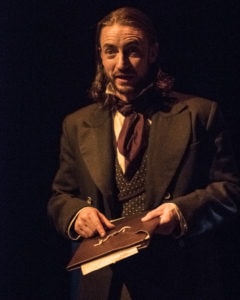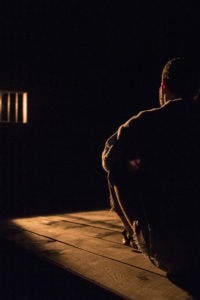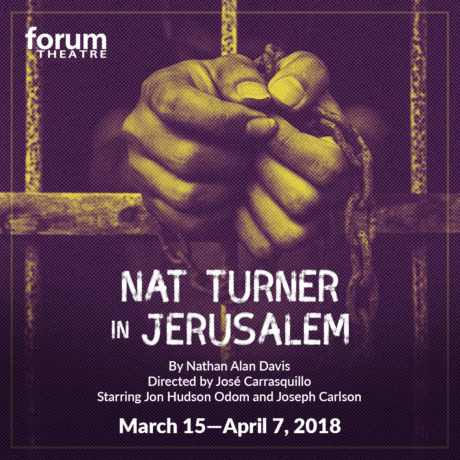By coincidence, Nat Turner in Jerusalem opened at Forum Theatre the day that The Raid closed at Theater Alliance. The two plays seen in succession are powerfully connected. Idris Goodwin’s The Raid imagines John Brown, the white Abolitionist who attempted to arm blacks for a revolt against slavery by leading a raid on Harper’s Ferry in 1859. Nathan Alan Davis’s Nat Turner in Jerusalem imagines Nat Turner, the black revolutionary who, 28 years before the Harper’s Ferry raid, led freed blacks and slaves like himself in an armed insurrection. To see both plays and connect the dots between them is to bear witness to a galvanizing sign of our times. For just as the box office juggernaut Black Panther instills an aspirational vision of black power and sovereignty, so do these two back-to-back plays reclaim and honor a heritage of black pride and rebellion.

Davis is the author of Dontrell, Who Kissed the Sea, a play I admired enormously when Theater Alliance did it three years ago. He has based Nat Turner in Jerusalem on a pamphlet published in 1831 by a lawyer, Thomas R. Gray, who transcribed Nat’s confession from interviews during their meeting in the Virginia jail cell where Nat was awaiting execution.
The character that emerges in The Confessions of Nat Turner is not at all what one would expect: He is no raving renegade. He is a devout Christian preacher who from a young age had precocious prophetic powers and believes he was divinely inspired to lead the insurrection. So it is with factual justification that faith becomes the fulcrum on which Davis balances this riveting play.
In one of several scenes between Nat (Jon Hudson Odom) and Thomas (Joe Carlson), the lawyer, an ardent secularist, declares:
THOMAS: The truth is, people will attribute whatever they decide is virtuous to God…. The Abolitionists think God hates slavery. The powers that reign in Virginia think God loves it….
God is not going to free the negroes. And this insurrection will only serve as proof for the argument that your people must be more severely controlled.
But Davis has given Nat an eloquence and purity of heart that Thomas’s skepticism and pragmatism are no match for. For instance, upon being pressed by Thomas to disclose information about possible conspirators and future rebellions that might occur, Nat says simply, as if gently preaching a parable:
NAT: The wind blows and the leaves are stirred…. What good does it do to ask one leaf what the others are up to?

Nat is on stage the whole time, wearing tattered clothes in a dim jail cell framed in wooden planks with a single barred window letting in sunlight. He has lyrical monologues addressed to objects—his shackles, a lamp—and mesmerizing exchanges with Thomas and with a Guard (also played by the versatile Carlson). Under the sensitive direction of José Carrasquillo, the scenes proceed in a heightened diction that harks back in time. It is as if we are being subtly prompted to meditate on the meaning now of the thorny themes Davis lays out.
For instance, referring to the carnage left after the insurrection, Thomas challenges Nat,
THOMAS: Did you manage to defeat anyone who was not a child, a woman or otherwise wearing his pajamas?
NAT: Yes, we did….We did the work of death upon as many of your kind as we could. Victory was never promised. This was not war, Mr. Gray. This was warning.
And later…
THOMAS: Why would any Holy Being want that?
NAT: What do you think holy vengeance is supposed to look like?

The marvel is that given such righteously over-the-top speeches, Nat emerges movingly as very human, a seer and prophet maybe but not a madman or lunatic. And that is due to the emotionally sublime performance of Jon Hudson Odom. At times he seems possessed of a passionate certainty that could only originate in some other realm where justice is held sacred, and he makes us believe that realm exists.
NAT: The signs, Thomas Gray, are everywhere. The uprisings will never cease until injustice ceases…
To cease injustice is your only recourse. Already the sands are shifting beneath your feet.
Nathan Alan Davis’s Nat Turner in Jerusalem is a theater experience that grabs you heart, mind, and soul. And very like the insurrection it references, it is a prophetic symbolic action: An enduring stirring of leaves. And an audacious shifting of sands.
Running Time: About 85 minutes, with no intermission.
Nat Turner in Jerusalem plays through April 7, 2018, at Forum Theatre, performing at the Silver Spring Black Box Theatre – 8641 Colesville Road, in Silver Spring, MD. For tickets, call (301) 588-8270, or purchase them online.
LINKS:
Review: ‘The Raid’ at Theater Alliance by
Review: ‘Dontrell, Who Kissed the Sea’ at Theater Alliance by





